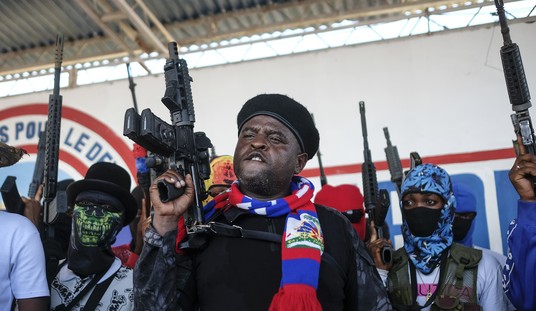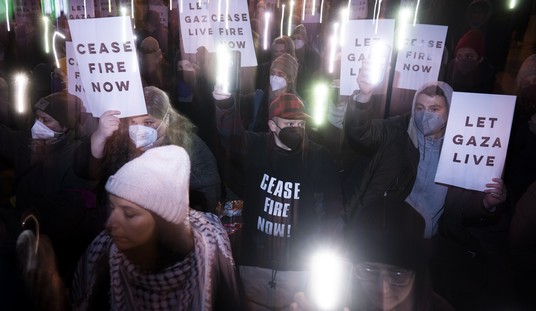The US and EU did some saber-rattling yesterday over the Russian invasion of Crimea, but few took seriously the notion that either would go to war over Ukraine. John Kerry warned that “all options are on the table” yesterday before flying to Kyiv, but the US has no strategic or military interest in Ukraine, let alone the Crimean peninsula, and Europe wouldn’t have the logistical infrastructure to fight the Russian Army on the Dnieper River.
On the other hand, the West can wage economic and diplomatic war — and that started yesterday, as the G8 cancelled a meeting that was to take place in Sochi, with Vladimir Putin as host. The US and EU threatened to kick Russia out of the G-8 altogether, and started cancelling a slew of other economic engagements as well:
The Obama administration on Sunday worked to isolate Russia on the world stage even as its president, Vladimir Putin, showed no signs of rolling back his military intervention in Ukraine.
ADVERTISEMENTPresident Obama spoke by phone with leaders from Great Britain, Germany and Poland, and he dispatched Secretary of State to Kiev on Tuesday for a show of solidarity with the new Ukrainian government.
After suspending preparations for an upcoming Group of 8 summit in Sochi, the administration began canceling lower-level diplomatic and economic meetings with Russian counterparts. And senior administration officials warned that Russia could be booted from the G8 altogether and that its economy would suffer because of Putin’s decision to occupy the Crimean peninsula following the ouster last week of Ukraine’s pro-Russia president, Viktor Yakunovych.
The strategy, described in a briefing senior administration officials on the condition of anonymity, was aimed at demonstrating to Putin that his intervention in Crimea would not go unpunished while also offering him “an offramp” if he chose to reverse course.
“It is Russia’s choice to behave in this manner,” one senior administration said, or whether it wants to return “to the community of civilized nations.”
If that didn’t get Putin’s attention, it got the attention of investors in Russian markets. The ruble plummeted to “historic lows” against the dollar and euro today and the MICEX fell more than 10% as Moscow investors panicked:
Russian stock markets Monday crashed almost 10 percent and the ruble plunged to historic lows in value against the dollar and euro, as alarm grew over the potentially disastrous economic consequences of military intervention in Ukraine.
Russia’s central bank hiked its main interest rate in an emergency move to stem capital flight and the losses for the ruble, amid what risks becoming at least Russia’s worst economic crisis since 2009. …
Military intervention will drain further resources from a Russian budget already stretched by costs like the Sochi Olympics, alarm already nervous investors, limit Russia’s economic ties with the West and force Russian companies into huge write-offs in Ukraine.
“Sochi was already expensive. Military adventures and strained relations with the West can be much more expensive than that,” said economist Holger Schmieding at Berenberg Bank in London.
“Russia cannot afford that in the long run,” he added.
Can the West, though? Bloomberg’s editors point out that an economic war won’t be cost-free for the West either — but it may be the only option left:
In 2011 alone, Russians spent $12 billion buying properties outside Russia. The lawmaker who in 2012 introduced a bill in the Russian parliament to outlaw officials from holding foreign assets estimated that they were keeping $100 billion abroad. Putin’s purpose in pushing this bill was precisely to reduce a point of leverage that might one day be used against him. Western leaders should not hesitate to use it now.
By the same token, both the U.S. and the EU could do a great deal more to investigate illicit financial transactions by Russian banks and in bank accounts from Cyprus to the City of London to the Caribbean. The threat of such inspections and what they would reveal about Russia’s kleptocracy, as well as eventual asset freezes, would also help concentrate minds in Moscow. Juan Zarate, a former assistant secretary to the U.S. Treasury for terrorist financing and financial crimes, has described how this could be done to pressure Russia over its support for Syrian President Bashar al-Assad. A threatened takeover in Ukraine is further powerful reason to act.
There is no doubt that even talking about such actions would further sour the relationship between Russia and the West. Putin could end Russia’s cooperation in Afghanistan, complicating the military withdrawal there, and undermine international efforts to deal with Iran and Syria. There would be costs in lost business for banks in London, Germany and elsewhere, and Putin surely would retaliate against Western companies operating in Russia. Yet if troops march into Ukraine, all this and more will happen anyhow.
The interests of the EU and the U.S. aren’t just democratic values and the desire to avoid war. There is also the need to end Putin’s assumption that he can trump international law and the treaties he has signed — the idea that Russia can invade without penalty any country it perceives to be mistreating expatriate Russians, and change its borders. If Putin is willing to launch a war to seize Ukrainian territory, he may also be prepared to move on other ex-Soviet states with large ethnic Russian populations, including Estonia and Latvia. Europe and the U.S. should be willing to bear costs in order to draw the line.
Given the relationship with Hamid Karzai, our withdrawal from Afghanistan is practically already a fait accompli anyway … but that’s another post for today. Since the West isn’t interested in going to war to save Ukraine, we will have to force Russia to deal with these consequences regardless of the costs involved to the West.








Join the conversation as a VIP Member